

Aphasia, alexia, and oral reading. 2014 Disconnection Theory - Brain Areas & Dyslexia. A new study used fMRI images to compare brain activity in adults with dyslexia versus normal readers, finding that dyslexics had a faulty connection between the areas of the brain that process acoustic/phonetic information and the area that uses that information for language.
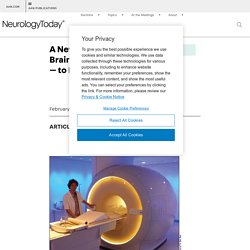
Dyslexia can cause lifelong difficulties in a world that is built on the written word. Now, a team of scientists from the University of Leuven in Belgium, Oxford University, and University College London present data that challenges the most prominent theory of why so many people have problems reading and spelling. Bart Boets, PhD, and his colleagues combined functional MRI with multi-voxel pattern analysis in adults with dyslexia. Their experiments were designed to tease out whether dyslexics have acoustic deficits that lead to fuzzy representations or whether they have normal phonetic representations but difficulty accessing these representations further upstream for language processing.
But they did not. Dr. Dr. Dyslexia brain news. Dyslexia and Language Brain Areas. Dyslexia and Language Brain Areas The learning disability dyslexia, which centers on difficulties in reading, once stumped scientists.
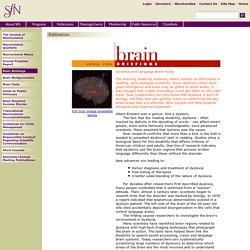
Since dyslexics often have good intelligence and even may be gifted in some areas, it was thought that a little motivation could get them on the right track. Now researchers not only know that dyslexia is born of biology, but they also are getting closer to confirming the key brain areas that are affected. New insights will help pinpoint therapies and improve treatment.
Albert Einstein was a genius. New advances are leading to: Earlier diagnosis and treatment of dyslexia. For more information please contact Leah Ariniello, Science Writer, Society for Neuroscience, 11 Dupont Circle, NW, Suite 500, Washington DC 20036. How to Get a Professional Dyslexia Diagnosis - Reading Horizons At-Home. You would think getting a professional dyslexia diagnosis would be a rather simple task, however, through the frustration of many callers and parents; it has become evident that obtaining a professional dyslexia diagnosis can be a rather difficult task.
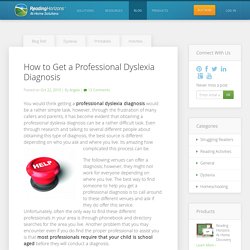
Even through research and talking to several different people about obtaining this type of diagnosis, the best source is different depending on who you ask and where you live. Its amazing how complicated this process can be. The following venues can offer a diagnosis; however, they might not work for everyone depending on where you live. The best way to find someone to help you get a professional diagnosis is to call around to these different venues and ask if they do offer this service. Unfortunately, often the only way to find these different professionals in your area is through phonebook and directory searches for the area you live.
Licensed Psychologists: Medical Doctor: Universities: Schools: Eye Doctors: Diagnosing Dyslexia. Upon completion of this section, you will Learn the components of a diagnostic evaluation for dyslexia Be familiar with the diagnostic tests available Be able to identify the indicators of dyslexia across the age span This guide is intended for those of you who are new to the world of dyslexia.
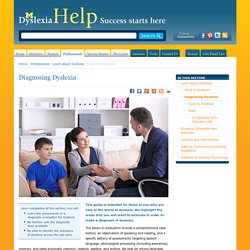
We highlight the areas that you will want to evaluate in order to make a diagnosis of dyslexia. The basics to evaluation include a comprehensive case history, an observation of speaking and reading, and a specific battery of assessments targeting language, reading, spelling, and writing. We look for poor performance in decoding text, reading fluently, spelling, and/or writing that is not in concert with the individual's predicted performance. You will need to help the individuals with dyslexia and parents understand that reading, spelling, and writing are language-based skills. The Case History—Pre-assessment Information You will want to review the individual education plan (IEP) if there is one. Dyslexia Treatments and drugs. There's no known way to correct the underlying brain abnormality that causes dyslexia — dyslexia is a lifelong problem.
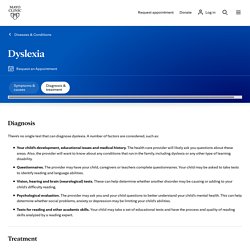
However, early detection and evaluation to determine specific needs and appropriate treatment can improve success. Educational techniques Dyslexia is treated using specific educational approaches and techniques, and the sooner the intervention begins, the better. Psychological testing will help your child's teachers develop a suitable teaching program. Teachers may use techniques involving hearing, vision and touch to improve reading skills. If available, tutoring sessions with a reading specialist can be very helpful for many children with dyslexia. Learn to recognize the smallest sounds that make up words (phonemes) Understand that letters and strings of letters represent these sounds Comprehend what he or she is reading Read aloud Build a vocabulary If your child has a severe reading disability, tutoring may need to occur more frequently, and progress may be slower.